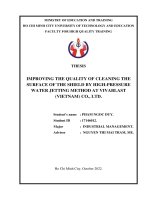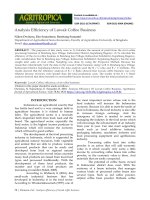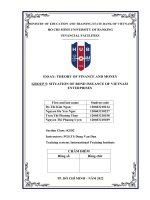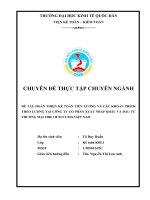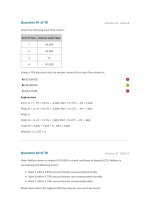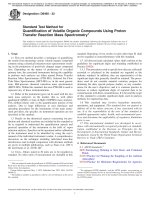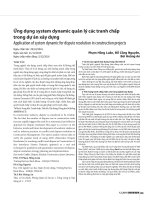fatigue characterization of flowformed a356 t6
Bạn đang xem bản rút gọn của tài liệu. Xem và tải ngay bản đầy đủ của tài liệu tại đây (152.06 KB, 3 trang )
MATEC Web of Conferences 12, 03001 (2014)
DOI: 10.1051/matecconf/20141203001
C Owned by the authors, published by EDP Sciences, 2014
Fatigue characterization of flowformed A356-T6
Matthew J. Roy1,a , Daan M. Maijer2 and Jianbin Zhao2
1
University of Manchester, School of Mechanical, Aerospace and Civil Engineering. Sackville Street
Building, Manchester, UK M13 9PL
2
University of British Columbia, Department of Materials Engineering. 6350 Stores Road, Vancouver,
Canada V6T 1Z4
Abstract. Flowforming is an incremental rotary forming technology consisting of
deforming a cylindrical workpiece through contact between a roller and a rotating mandrel.
This process delivers significant local compressive plastic strain to the workpiece. The
effects on fatigue resilience of a common aluminum foundry alloy (A356) processed in
this manner at an elevated temperature has been shown to improve post heat treatment.
Fatigue properties of material processed with a standard heat treatment following casting
is compared to material which has been cast and flowformed to varying degrees and
then heat treated. Flowformed material with varying degrees of rotary deformation have
been tested. Endurance limits have been found to be generally governed by porosity and
maximum principal stress for high cycle fatigue on undeformed material. Fatigue properties
have been quantified employing stress-life relationships derived from uniaxial fatigue
tests. A 30% increase in the high-cycle endurance limits of flowformed compared to
non-deformed material has been observed and is linked to the extent of deformation.
Fractographic examination shows that this increase in endurance limit can be attributed
primarily to the mitigation of porosity. Microstructural changes due to processing appear to
be a secondary factor.
1. Introduction
Forging cast aluminium components is a relatively expensive manufacturing process that can improve
mechanical properties. A lower cost alternative for axisymmetric components is flowforming. In this
process, a small portion of a rotating workpiece is impinged between a roller and a mandrel, such that
only a small amount of material is compressively deformed at a time. Forming cast A356 must be carried
out at elevated temperature to garner additional ductility. This type of processing mitigates porosity and
causes microstructural changes that lead to improved fatigue resilience.
2. Experimental overview
Two sources of flowformed A356 were employed in the current study. A quantity of material in the asformed condition was received from a North American automotive wheel manufacturer with a high
a
Corresponding author:
This is an Open Access article distributed under the terms of the Creative Commons Attribution License 4.0, which permits
unrestricted use, distribution, and reproduction in any medium, provided the original work is properly cited.
Article available at or />
MATEC Web of Conferences
Figure 1. S–N data for undeformed (I commercial & II experimental) versus
flowformed (III commercial & IV experimental). Lines indicate Basquin fitting
to infer fatigue limits.
Figure 2. As cast vs. deformed microstructure.
amount of deformation (>50% thickness reduction). Material with a lower amount of deformation
(∼10% thickness reduction) was processed with an experimental forming apparatus located at the
University of British Columbia. This material, in addition to material drawn from undeformed blanks
from both the commercial and experimental materials was heat-treated to the T6 condition (3 hours at
540 ◦ C, 60 ◦ C water quench, immediate artificial ageing at 150 ◦ C for 3 hours) and had uniaxial fatigue
specimens extracted. These uniaxial fatigue specimens were run-out tested on a Sonntag eccentric
fatigue machine under fully reversed (R = −1) loading conditions, targeting the high-cycle regime.
See Ref. [1] for further experimental details regarding the flow forming process.
3. Results and discussion
The results of the fatigue testing show that there is an appreciable improvement in flowformed material
over undeformed post-heat treatment. The improvement was quantified by fitting Basquin relationships
(b = 0.17) through data from both commercially and experimentally formed material. The Basquin
relationship resulted in a fatigue limit at 106 cycles of 75 MPa for as-cast and 107 MPa for flow formed
material.
The principal cause for the increase in fatigue limit is the mitigation of porosity. The main indicator
that porosity has been diminished is the overall range of fatigue limits found with undeformed material
as compared to formed. Furthermore, higher fatigue limits were found with specimens having a greater
extent of deformation, which increases the chance of closing pores. Fatigue crack initiation was found at
very small pores or inclusions, which implies that porosity was not completely eliminated. Examination
of the fracture surfaces of some of the commercially flowformed specimens showed generally a more
ductile material, with striations easily observable as compared to undeformed material with the same
temper [2]. Fracture surfaces of the formed material were also found to be more irregular than the
undeformed, which indicates that crack path deflection was more prominent. This latter observation is
likely due to eutectic particle refinement as smaller particles have been found to increase fatigue limits
in this alloy system [3].
Changes to the microstructure imparted by flowforming, such as recrystallization and eutectic
particle refinement, coupled with porosity mitigation are deemed to be the principal reasons for the
30% increase in fatigue limit in the high-cycle regime.
03001-p.2
FDMDII - JIP 2014
References
[1] M. J. Roy, PhD Thesis, University of British Columbia (2013)
[2] M. Roy, Y. Nadot, D.M. Maijer, G. Benoit, Fatigue Fract. Eng. M. 35 (2012)
[3] Q.G. Wang, D. Apelian, D.A. Lados, J. Light Met. 1 (2001)
03001-p.3


